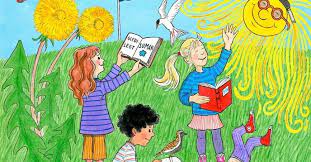
23 April is a significant date in world literature; it is anniversary of the death of William Shakespeare, Miguel de Cervantes and Inca Garcilaso de la Vega Miguel de Cervantes, as well as that of the birth or death of several other prominent authors. This date was a natural choice for UNESCO’s General Conference, held in Paris in 1995, to pay a world-wide tribute to books and authors on this date, encouraging everyone to approach books for knowledge and fun. As a matter of fact, it is celebrated on the first Thursday of March in the UK every year.
This is the day on which authors, readers, critics, publishers, and editors congregate at a single place to make the event a grand success. Alternatively referred to as Copyright Day and International Book Day, promoting copyright values, which has now become one of the actual objectives behind organizing such a unique festival.

The World Book Day is one of the highlights of this year at the National Literacy Trust. This has been the day that was deemed as an opportunity to go all out, with children dressing up as their favourite book characters. While this year may be slightly different than usual, due to the ongoing pandemic across the world; at a time when most of the schools around the world are closed and people are having to limit their time indoors, the power of books should be leveraged to combat isolation, reinforce ties between people, expand our horizons, while stimulating our minds and creativity.

Through reading and the celebration of the World Book and Copyright Day, 23 April, we can open ourselves to others despite distance, and we can travel far, thanks to imagination. When the world around is chaotic and all one wants to do is shut out reality, losing yourself in a book is the best escape. As words leap out from a page and paint a picture of distant lands with diverse characters and intriguing stories, life starts to appear somewhat better.
Reading for pleasure is at the heart of World Book Day. Making every day a book day can have significant impacts on children and young people’s wellbeing. Three in five (59.3%) children and young people during the first lockdown stated that reading makes them feel better. It shows just how important it is to encourage children to read for pleasure during these disturbing times.

Children who regularly read for enjoyment have higher test scores, develop a broader vocabulary, increased general knowledge and a better understanding of other cultures than their non-reading counterparts. Whether you read traditional paperbound books or turn to your Kindle/iPad/whatever, reading is a definite passport to travel uninhibitedly to different worlds, in the shortest time.

This year’s World Book Day theme is ‘share a story’. One can encourage children to share stories with the people they live with or include family and friends over e chats. These could also include setting aside a family reading time when everyone at home reads his/her own books or magazines; building a cosy reading den with cushions and mats in a corner; or a play act with props – sheet draped over chairs to make a tent; or simply read a story or chapter and then act it out together…as literati.